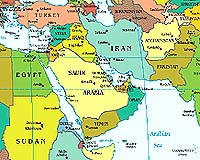| . |  |
. |
Yangon (AFP) March 31, 2011 Myanmar's attempt to rebrand itself with a nominally civilian government was met with scepticism at home and abroad on Thursday, with critics fearing army power has merely moved into the shadows. Newspapers were sold out on the streets of Yangon a day after former general Thein Sein was made president and the feared junta was disbanded following nearly half a century of military rule. But while the new order provoked interest, there was little optimism. Company manager Konaing said the new parliament, which is dominated by the army hierarchy and lacks the participation of democracy icon Aung San Suu Kyi, was a "hot issue" with ordinary people. "But they do not think there will be changes in the country as the generals only changed their uniforms. We have not many expectations, not much hope," he told AFP. Wednesday's handover came after Myanmar's first elections in 20 years last November, which were slammed by critics as a sham to provide a civilian facade to army rule, and marred by the absence of Suu Kyi, and by claims of cheating. Myanmar's strongman Than Shwe also relinquished his position at the head of the army during the power transfer, but many analysts believe the feared "senior general" will find a way to retain influence behind the scenes. In a rare address, printed in Thursday's government mouthpiece The New Light of Myanmar, Thein Sein insisted the Myanmar people "have elected us and given (us a) mandate". "I invite and urge some nations wishing to see democracy flourish and the people's socioeconomy grow in Myanmar to cooperate with our new government," he said. But the United States expressed concern over the country's "oppressive political environment", while United Nations Secretary General Ban Ki-moon urged Myanmar to prove "that this change is one of substance". China however voiced its approval of the country's "independent choice of development path and hopes to see sustained stability and progress in democracy in the country, so as to achieve democratic development". Myanmar's influential northern neighbour is to send a senior official to meet Thein Sein on Sunday, the first international engagement of his presidency. "We hope the international community will create a sound environment for Myanmar to achieve economic growth," Beijing said, in a nod to economic sanctions enforced by the US and European Union because of Myanmar's human rights abuses. The election, and Suu Kyi's release from house arrest a few days later, divided the opposition and reignited a debate about sanctions. Suu Kyi's National League for Democracy (NLD), which has no voice in parliament and was disbanded for boycotting the poll over rules seemingly designed to exclude her, said it "acknowledged" the changes. "As the NLD mainly works for national reconciliation we expect to start a dialogue with the new government," said spokesman Nyan Win. Opposition group the National Democratic Force (NDF), which split from Suu Kyi's party to participate in the vote, said the president's speech promising to focus on healthcare and education, was "very significant". "We can see that he has the desire to reform but we have to wait and see whether it really happens," said the party's leader Khin Maung Swe. Thein Sein, the country's former prime minister and a key Than Shwe ally, is among a slew of generals who shed their army uniforms to contest the elections and are now civilian members of parliament. His junta-backed Union Solidarity and Development Party (USDP) bagged 388 of the national legislature's 493 elected seats the election, while a quarter of the assembly was already reserved for military legislators. "Many government workers are hoping for change," one Myanmar official said, on condition of anonymity. But Myanmar analyst Maung Zarni, of the London School of Economics, said: "It requires a tremendous degree of suspension of rational thought and empirical knowledge to feel any sense of optimism" with the new government.
Share This Article With Planet Earth
Related Links Democracy in the 21st century at TerraDaily.com
 Middle East censors wield Western software: report
Middle East censors wield Western software: reportSan Francisco (AFP) March 28, 2011 Even as Western leaders call for democratic freedom in the Middle East, software from US and Canadian firms is being wielded by censors in oppressive regimes, a report said Monday. Programs crafted to keep children from getting to porn websites or other material deemed off-limits by parents can readily be modified for mass political censorship, according to OpenNet Initiative (ONI) findings. ... read more |
|
| The content herein, unless otherwise known to be public domain, are Copyright 1995-2010 - SpaceDaily. AFP and UPI Wire Stories are copyright Agence France-Presse and United Press International. ESA Portal Reports are copyright European Space Agency. All NASA sourced material is public domain. Additional copyrights may apply in whole or part to other bona fide parties. Advertising does not imply endorsement,agreement or approval of any opinions, statements or information provided by SpaceDaily on any Web page published or hosted by SpaceDaily. Privacy Statement |